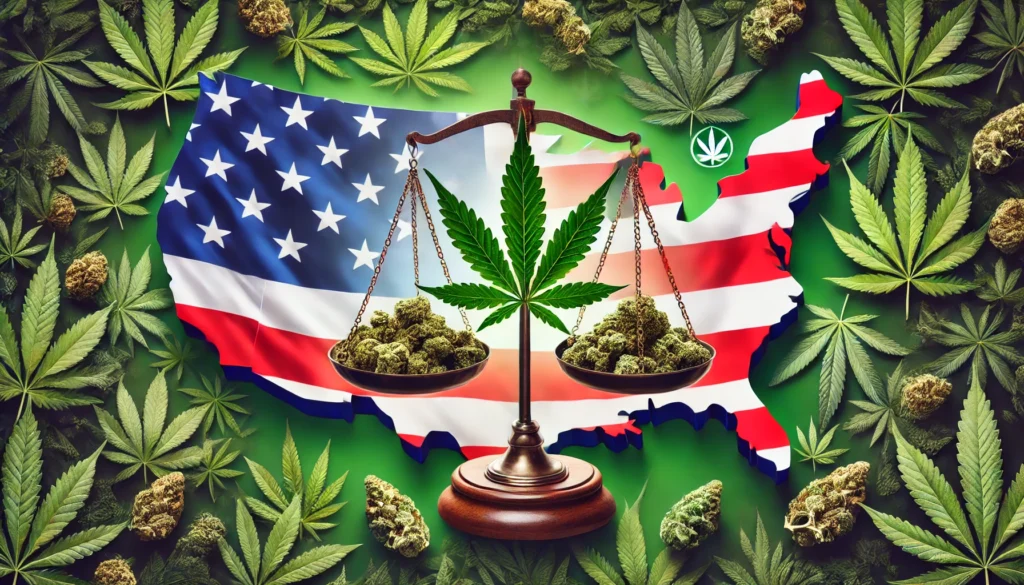Legalized Marijuana Nationwide & Estimated Tax Revenue

Current Tax Revenue from States with Legalized Marijuana
States that have legalized marijuana, such as Colorado, California, and Washington, have generated significant tax revenue. On average, states with legalized recreational marijuana typically see between $200 million and $1 billion per year in tax revenue, depending on the size of the state and its market.
For example:
- Colorado: $350 million+ per year
- California: Over $1 billion per year
- Washington: Around $500 million per year
National Population Extrapolation
The U.S. population is around 330 million. The total population in states where recreational marijuana is legal (as of 2023) is approximately 150 million. Assuming the remaining states would have similar per capita tax revenues, we can estimate the nationwide potential.
Estimated Tax Revenue Nationwide
If states where marijuana is legalized are already generating between $200 million to $1 billion per year in tax revenue, we can scale this to a national level.
- Using a rough estimate, the total marijuana market in the U.S. could generate $10 billion to $15 billion in tax revenue annually if recreational marijuana were legalized nationwide. This assumes that the entire U.S. would generate tax revenue at a rate similar to states that have already legalized marijuana.
Adjustments for Tax Rates
Tax rates on marijuana sales vary from state to state. States like California have a combined state and local tax rate of around 15-25%, while others may have lower or higher rates. If the federal government imposed its own taxes on marijuana in addition to state taxes, this figure could increase further.
If marijuana were legalized nationwide, it is estimated that the U.S. could generate between $10 billion and $15 billion annually in additional tax revenue, based on current state tax rates in states where marijuana is already legal.
Legalizing marijuana not only directly increases tax revenue from marijuana sales but also has a broader economic impact on related industries and businesses, like restaurants, retail, tourism, and real estate. Using data from states where marijuana has been legalized, we can estimate the ripple effects on other businesses. Here’s an analysis of the potential indirect economic growth:

Food and Beverage Industry (e.g., Fast Food)
- States with legal marijuana have seen increased sales in fast-food chains like Taco Bell, McDonald’s, and Domino’s. This is often attributed to increased consumer spending due to the well-known “munchies” effect associated with marijuana use.
- Studies have found that fast-food sales increase by around 10-15% in areas where recreational marijuana is legalized. For example:
- Colorado saw a significant spike in fast food sales post-legalization.
- Restaurants such as Taco Bell and Pizza Hut reportedly see upticks in sales of 10-15% following legalization.
- National Extrapolation: If marijuana were legalized nationwide, the fast-food industry could see a 10-15% boost in annual revenue. The U.S. fast-food industry generates about $300 billion annually, so a 10-15% increase translates to $30 billion to $45 billion in additional sales annually.

Tourism and Hospitality
- States like Colorado and California have also reported increased tourism due to marijuana legalization. Marijuana tourism contributes to the growth of hotels, restaurants, and related services. Colorado saw tourism grow by about 6-8% annually post-legalization, largely driven by marijuana-friendly attractions.
- Nationally, the U.S. tourism industry is worth over $1.1 trillion. A conservative estimate of a 1-2% increase in tourism revenue could result in an additional $11 billion to $22 billion per year in tourism-related spending.

Retail and Ancillary Businesses
- Legalized marijuana boosts sales for retail stores that sell cannabis-related paraphernalia (e.g., smoking accessories), as well as businesses in industries like real estate (due to the demand for commercial properties) and agriculture (for growing cannabis).
- Retail sales for ancillary products could grow by 5-10% due to increased demand for accessories, clothing, and lifestyle products associated with marijuana use. The U.S. retail industry is worth about $5.4 trillion, so even a 0.5% boost from cannabis-related products could add $27 billion annually.

Real Estate and Commercial Space
- The marijuana industry creates demand for warehouses, retail spaces, and growing facilities. Commercial real estate growth in marijuana-legal states has been robust, with states like California and Colorado seeing warehouse prices rise by 10-20%.
- This growth in real estate also contributes indirectly to increased tax revenues through property taxes.

Other Business and Job Growth
- Legalization can also lead to job creation. For instance, Colorado’s cannabis industry has created over 30,000 direct jobs and many more indirect jobs in marketing, security, and transportation.
- The economic impact of job creation can be significant, with studies showing that for every $1 spent on marijuana, about $2.50 circulates back into the economy due to business growth and jobs.
Total Economic Impact
To summarize the combined impact on business growth and sales:
- Fast-food/Restaurant Industry: An increase of $30 billion to $45 billion in sales.
- Tourism: An additional $11 billion to $22 billion in spending annually.
- Retail and Ancillary Businesses: Growth of $27 billion.
- Real Estate: Strong growth in property values, particularly commercial spaces for marijuana cultivation and retail, although harder to quantify directly.
Sales Tax Impact
Assuming an average combined state and local sales tax rate of 6-8%, the additional sales tax revenue from these industries alone would be substantial:
- Fast food/restaurant sales tax: $30 billion to $45 billion × 6-8% = $1.8 billion to $3.6 billion in extra sales tax revenue.
- Tourism-related sales tax: $11 billion to $22 billion × 6-8% = $660 million to $1.76 billion.
- Retail sales tax: $27 billion × 6-8% = $1.62 billion to $2.16 billion.
Total Estimate for Business Growth:
- Total economic impact from marijuana legalization across multiple industries could range from $68 billion to $94 billion per year.
- Additional sales tax revenue could range from $4.08 billion to $7.52 billion per year.
Conclusion:
If marijuana were legalized nationwide, the indirect business growth across various sectors could be substantial, generating between $68 billion and $94 billion in additional economic activity and contributing an estimated $4 billion to $7.5 billion annually in extra sales tax revenue.






